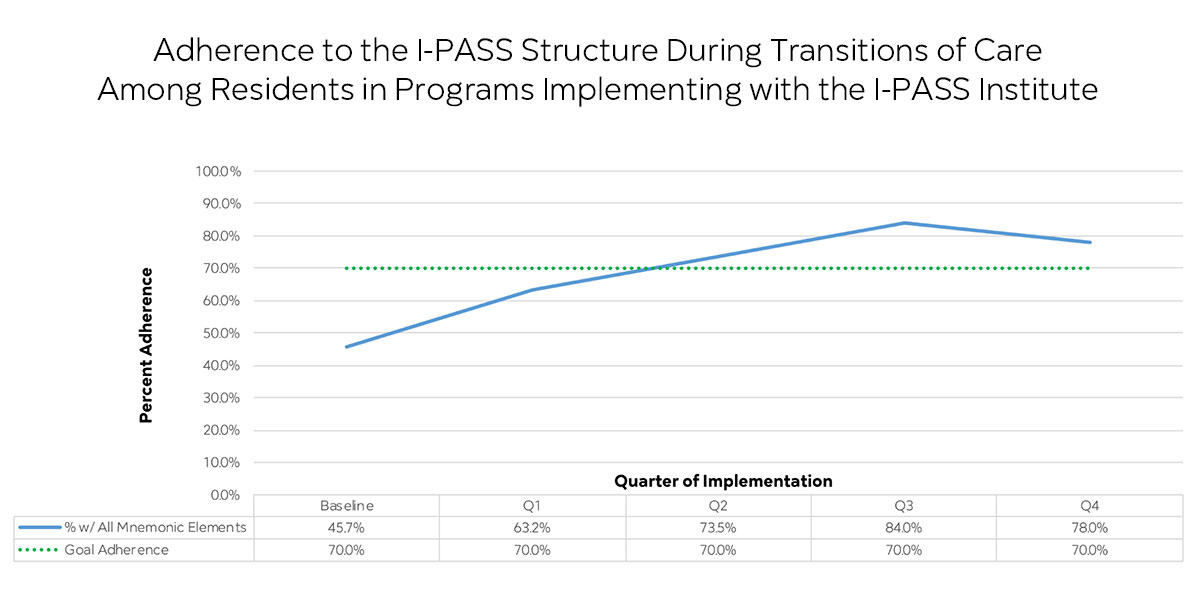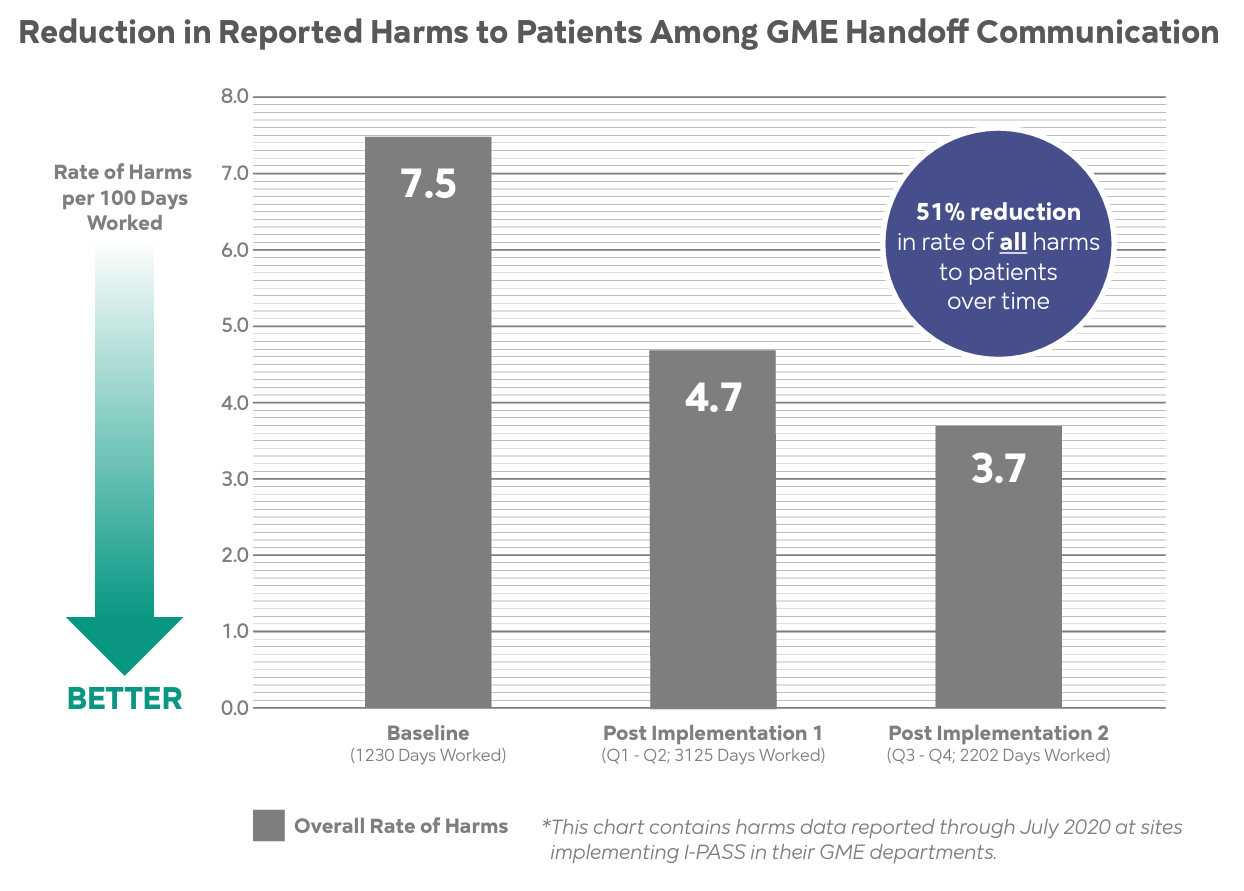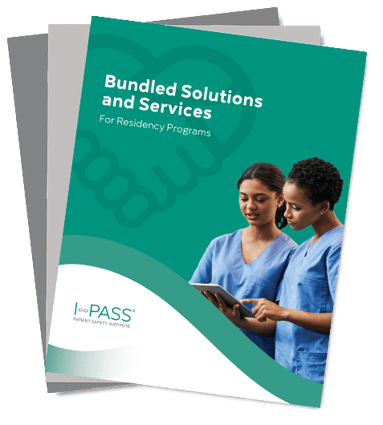GME Program
Bundled Solutions for Residency Programs
The I-PASS Institute offers solutions for training residents in an evidence-based handoff communication method that is clinically proven to reduce patient harm and assessing their adherence to the method over time.
Training, Assessment & Written Handoff Tool
Training
An interactive, online virtual environment in which residents complete both a verbal and written handoff. Our program then synthesizes the handoffs and compares them to a “gold standard” response. Training takes approximately 45 minutes and can be completed prior to or during orientation.
Assessment & Improvement
A software tool that facilitates learning, feedback, and reinforcement through direct observation of handoff sessions. This platform measures residents’ adherence to the mnemonic and the quality of their communications, and can also collect reports of patient harms related to handoffs.
Written Handoff Tool
The I-PASS Written Handoff Tool, a critical element of the I-PASS methodology, can be optimized within your existing EHR, providing your teams with a valuable companion document to support verbal handoff.
I-PASS Webinar Replay | Cultivating a Patient Safety Culture at Mount Sinai: A Guide for GME Programs to Implement and Train Residents on I-PASS Handoff Communication
Over the past several years, Dr. Robert C. Goldszer, Chief Medical Officer and Senior Vice President of Education and Research at Mount Sinai Medical Center, has overseen the implementation of I-PASS methodologies within the institution’s GME Program, establishing a new standard in patient communication: the I-PASS handoff method. Today, residents, fellows, attendings, and medical staff are trained in the I-PASS method—including incoming residents and fellows before their first day. Tune in to watch I-PASS Co-Founder Dr. Christopher Landrigan and Dr. Goldszer discuss the benefits and processes for adoption and sustainment of the GME handoff training program, and firsthand experience and lessons learned from program implementation at Mount Sinai.
Our Bundled Solution for Your GME Program
GME Program Bundle
With our bundle of solutions, you can ensure all residents are trained on a structured handoff method, collect observation data to track progress, adherence and feedback, and provide residents with optimal tools for facilitating the written handoff process.
-
I-PASS Training
-
I-PASS Assessment & Improvement
-
I-PASS Written Handoff Tool
-
One-Time Setup & Configuration
Our bundle grants access to all three platforms for up to 300 residents and providers.
Professional Services to accompany the solutions on this page will be scoped and quoted per the needs of your residency program.
Benefits of I-PASS Adoption
Fulfills ACGME common requirements
Reduces handoff safety events
Provides a concrete step toward becoming a high-reliability organization
Provides potential financial savings from malpractice claims and reduced errors
Supports Joint Commission compliance
Improves the culture of safety scores
Supports cultural changes for sustainment
I-PASS Process for Adoption and Sustainment: Residency-Specific Data
The use of I-PASS Institute services and solutions improves the quality of care and reduces harm to patients.
Adherence Data
This graph depicts overall adherence to the I-PASS mnemonic among residents in programs implemented through the I-PASS Institute.

Patient Harms
Reduction Data
This bar chart depicts the reduction in provider-reported patient harms in residency programs implemented through the I-PASS Institute.

Do Your Residents Use a Standardized Process in Transitions of Care?
Think about these questions in relation to your program:
-
Does your program focus on transitions of care?
-
Do your residents use a standardized form of communication during handoffs?
-
Do you measure adherence to this communication method?
-
Do you measure the impact of this communication method on reductions in patient harm?
-
Has your written handoff document been adapted by the care area?
-
Does your written handoff document integrate with your EHR?
-
Is your program meeting the ACGME Transitions of Care Requirements?
If you responded “No” to any of the above, the I-PASS Patient Safety Institute can support you in answering “Yes”, and becoming ACGME compliant. Our bundle of interventions has been optimized for implementation with residency programs.
ACGME Common Program Requirements Section VI
| VI.E.3.a | Programs must design clinical assignments to optimize transitions in patient care, including their safety, frequency, and structure. (Core) |
| VI.E.3.b | Programs, in partnership with their Sponsoring Institutions, must ensure and monitor effective, structured hand-over processes to facilitate both continuity of care and patient safety. (Core) |
| VI.E.3.c | Programs must ensure that residents are competent in communicating with team members in the hand-over process.(Outcome) |
Download the I-PASS Residency Program Brochure
Discover how you can ensure compliance with the ACGME Common Program Requirements, Section VI.

Useful Links
Evidence
Get in Touch
Boston, MA 02108

